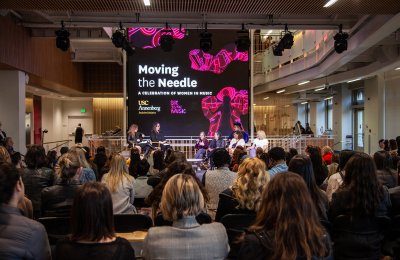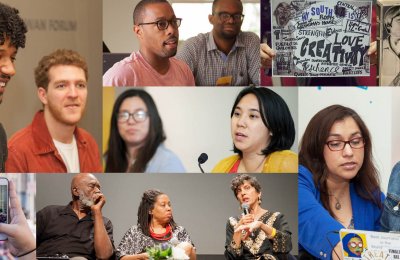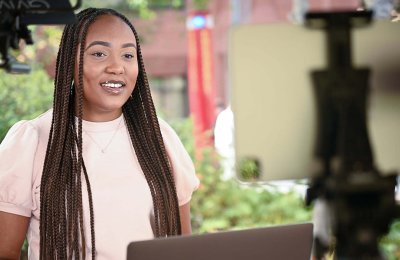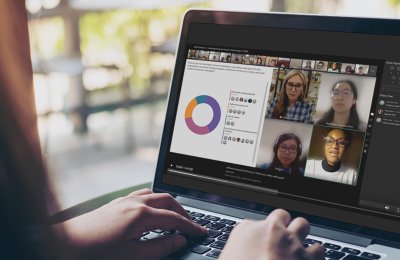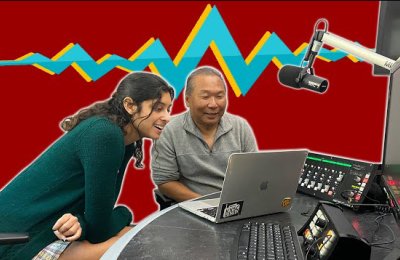Mission and Vision

At USC Annenberg, we believe that communication provides the most effective means to navigate a world of profound and constant change.
Our mission is to lead the expansive field of communication through groundbreaking scholarship, teaching and public service in a complex global multicultural environment. We consider this mission to be inseparable from our commitment to human dignity, which is embedded in our legacy.
Ambassador Walter H. Annenberg founded this school with a deep understanding of the power of communication embodied in these words: “The right to free communication carries with it the responsibility to respect the dignity of others…. Educating students to communicate this message effectively and to be of service to all people is the enduring mission of this school.”
This vision is reflected in our areas of research and practice, our curricula, and our engagement with our local and global communities. Advancing our core disciplines of communication, journalism, public relations and public diplomacy requires an embrace of the world’s complexity, attentiveness to all manners of difference, and respect for the dignity of every human being.
Through collaboration and continuous growth, we strive to create an environment where individual voices are valued, diverse perspectives are considered and meaningful dialogue flourishes. Rooted in our history, embraced in our present and guiding our future, this commitment supports a culture of inclusive excellence and transformative learning for our students, faculty and staff.
Inclusive Excellence
At USC Annenberg, we consider our mission inseparable from our commitment to inclusive excellence. We define diversity as it relates to the respect and inclusion of all variations of race, nationality, gender and gender identity, difference of ability, neuro-divergence, sexual orientation, socioeconomic status, age, and religious or political affiliations. This commitment shapes our community and culture, and is reflected across our research and practice, curricula, and engagement with our local and global partners.
1,200+
students and industry partners have completed the Managing Complexity in Diverse Organizations course, which prepares communications professionals to create and support inclusive work environments.
$2.5M
awarded through Student Success Fund and Student Emergency Assistance Fund to ensure equitable access for students.
Explore research centers and programs
Annenberg Inclusion Initiative
As the world’s leading think tank studying diversity and inclusion in the entertainment industry, the Annenberg Inclusion Initiative publishes data-driven and theory-based research to offer targeted insight and solutions that tackle inequality in media.
Institute for Difference and Empowerment in the Arts (IDEA)
IDEA explores the redemptive and transformational capacities of media, the arts and culture, with specific attention to what they illuminate about identity, difference and power.
Charlotta Bass Journalism and Justice Lab
The Bass Lab saves, studies and shares news stories and oral histories about Black social justice trailblazers on the West Coast. They connect USC Annenberg students to trusted media outlets that value Black storytelling — especially in XR.
Our commitment in action
Skills-building course prepares professionals to collaborate with, manage and lead diverse teams
Managing Complexity in Diverse Organizations prepares communications professionals to create and support high-performing, inclusive environments.
Student produced podcast explores L.A. Civil Unrest of 1992
The podcast series Forward Together, produced by Elle Davidson, Daniel Hahm, Hanna Kang and Celine Mendiola, explores the L.A. Civil Unrest of 1992 through the stories of diverse Angelenos.
IDEAS grant supports development of USC Annenberg’s first-of-its-kind study abroad program in Latin America
With the support of the IDEAS grant, Professor of Professional Practice Amara Aguilar will design, develop and launch “MESA: Mexico Experiential Storytelling Abroad,” a dual-language, semester-long study abroad course in Mexico.
- Seeing ME in the MEdia Mentorship Program: This student-to-alumni mentoring program supports juniors, seniors and graduate students — especially those who are first-generation — looking for support networks in the communication and media ecosystem. Learn more here.
- Annenberg Resource and Mentoring Program: This one-on-one mentoring program pairs a student with a faculty or staff member, who provides advice and information on campus resources and insights. This program is designed to help students adjust academically and socially to the college experience. Learn more here.
- Aquarius Trust Endowed Scholarship: This scholarship was established to ensure newsrooms reflect the communities they serve, and supports students with a demonstrated commitment to supporting ethical and inclusive journalistic practices.
- Paramount Inclusion in Journalism Scholarships: A partnership between Paramount and USC Annenberg to ensure newsrooms reflect the varied perspectives and experiences of the communities they serve. This scholarship supports students with a demonstrated commitment to supporting ethical and inclusive journalistic practices. This scholarship supports tuition costs for students enrolled in one of USC Annenberg’s journalism master’s programs.
These scholarship programs are administered consistent with the University’s Notice of Non-Discrimination. Recipients are chosen without regard to race, color, national origin, sex, sexual orientation, or any other prohibited characteristic.
These programs are open to all eligible individuals. USC Annenberg operates all of its programs and activities consistent with the University’s Notice of Non-Discrimination. Eligibility is not determined based on race, sex, ethnicity, sexual orientation, or any other prohibited factor.
- Annenberg Black Student Association Adviser: JaBari Brown, associate director, Annenberg Student Services
- Annenberg Cross-Cultural Student Association Adviser: Miki Turner
- Asian American Journalists Association, USC chapter Adviser: Dana Chinn
- National Association of Black Journalists, USC chapter Adviser: Lisa Pecot-Hébert
- National Association of Hispanic Journalists, USC chapter Adviser: Laura Castañeda
- Annenberg Media verticals include Black., Dímelo, Earth, Health and Wellness, and elevASIAN
- USC Annenberg Community and Culture Task Force is actively committed to helping faculty, staff and students combat long-standing societal divisions and prejudices by embedding and expanding inclusive excellence in every aspect of campus life. They help the USC Annenberg community implement strategies that build awareness, empathy and solidarity through ongoing professional development, programming and advocacy.
- USC Annenberg Asian American and Pacific Islander Committee promotes the wellbeing of AAPI faculty and staff within the school and advocates for change.
- USC Annenberg Latino Faculty and Staff Caucus promotes the wellbeing of Latino faculty and staff within the school and advocates for change.
- USC Annenberg Staff Council acts as the voice of the USC Annenberg staff, celebrating staff achievements, advocating on behalf of staff needs, and cultivating a working climate beneficial to all staff members here and at the greater university.
- USC Annenberg Faculty Council serves as the main means of communication between the faculty and the dean, as well as to the larger university via the Academic Senate.
These programs are open to all eligible individuals. USC Annenberg administers and operates all of its programs and activities consistent with the University’s Notice of Non-Discrimination. Eligibility is not determined based on race, sex, ethnicity, sexual orientation, or any other prohibited factor.
Managing Complexity in Diverse Organizations (MCDO) offers a professional skills-building curriculum that addresses a critical competency for 21st-century professionals — the ability to create, sustain and thrive within diverse work environments. This immersive, eight-week, learner-centered course, developed by USC Annenberg faculty, provides a core experience for communication and public relations master's students.
Optimizing Inclusion: A Learning Experience for Media Leaders, developed by USC Annenberg faculty, is focused on supporting an inclusive environment in USC Annenberg’s Media Center. The curriculum guides learners through developing the critical understanding and functional skills to help them collaborate with, manage and lead diverse teams more effectively, and to tell accurate, ethical and impactful stories about the complex communities in which we live, work and learn.
- USC Annenberg Diversity Plan, 2017–22
- USC Annenberg Diversity Plan Progress Report, 2020-22
- Laura Castañeda, USC Annenberg associate dean of community and culture
- USC Office of the Ombuds
